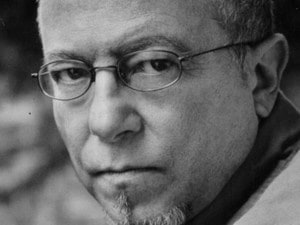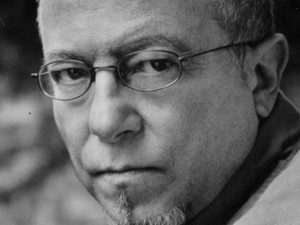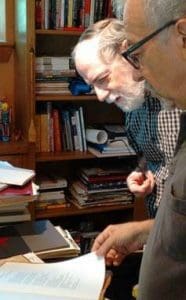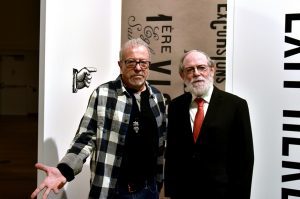By Timothy Shipe
University of Iowa Libraries Special Collections is pleased to announce the acquisition of the library and papers of noted Romanian-American writer Andrei Codrescu. Comprising approximately eighty linear feet of manuscripts, books, audiovisual material, digital media, art works, and ephemera, this acquisition is a major addition to the University Libraries’ literary collections, and will provide a treasure trove of material for researchers in a variety of fields.
Andrei Codrescu was born in Sibiu, Romania in 1946. His literary career began with a number of poems written in Romanian when he was in his teens; it was during this period that he changed his surname from “Perlmutter” to “Codrescu.” Emigrating to the United States in 1966, he soon started writing and publishing in English. Living first in Detroit, he moved to New York and then to California, coming into extensive contact with the New York School of poets as well as the Beats. He held teaching positions at Johns Hopkins University and, for many years, at Louisiana State University, commuting by Greyhound bus to Baton Rouge from his home in the French Quarter of New Orleans. Since his retirement from LSU, Codrescu has been living in New York City while maintaining a rural retreat in the Buffalo River Valley in northern Arkansas, where besides writing he has been experimenting with sculpture and collage-constructions.
Codrescu is perhaps best known for his regular commentaries on NPR’s All Things Considered beginning in 1983. His writing encompasses virtually every genre, including poetry, novels, short stories, plays, essays, book-length non-fiction, autobiography, and film scripts. In recent years he has resumed writing poetry in his “native” language, Romanian. (Romanian was actually his third language, since as a child growing up in Transylvania, he first spoke German and Hungarian.) Besides his numerous books of poetry and his novels, Codrescu’s most influential books include The Hole in the Flag (an account of his return to Romania as an NPR reporter just days after the 1989 revolution), The Disappearance of the Outside, The Posthuman Dada Guide, Bibliodeath, and a series of innovative autobiographical works. He is also well-known for editing the journal Exquisite Corpse, named after a surrealist game.
Andrei Codrescu has longstanding connections with Iowa City’s literary scene, having been friends with a number of local authors. His library is filled with dedication copies of books by Iowa writers, former participants in the International Writing Program, Beat poets, Romanian authors, and major figures representing every strand of contemporary American literature.
In February of this year Codrescu presented a lecture-performance in connection with the Libraries’ exhibition Documenting Dada, Disseminating Dada; the video is available online. During his visit, he met with a variety of groups on campus, including the School of Library and Information Science, the MFA Program in Translation, the International Writing Program, and library staff. Discussions began with Special Collections staff concerning the possible acquisition of his papers, and in August librarians Tim Shipe and Amy Chen visited Codrescu’s Arkansas studio to inspect the collection and discuss terms. Following the successful conclusion of these discussions, the collection arrived at the University Libraries in mid-October, and is now in the preliminary stages of processing.
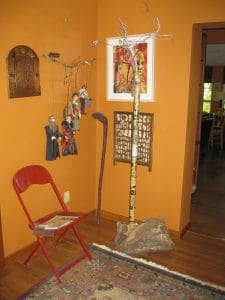
Among the highlights of the collection are three unpublished novels, manuscripts, correspondence, and ephemera related to the author’s published books (including the Romanian flag with the Communist symbol cut out that inspired the title of The Hole in the Flag), communications concerning assassination threats from the Romanian secret police, documentation of exhibitions, and a number of two- and three-dimensional collages and art installations. Also included are back-up copies of pre-1990 manuscript materials now housed at Louisiana State University. Codrescu’s library includes annotated books that Codrescu used during his research for his novels and non-fiction prose works. Also included is a comprehensive collection of Codrescu’s books, including some proof copies with manuscript revisions.
Andrei Codrescu’s collection promises to be a fruitful resource for researchers for many years to come, and a new draw for visitors to America’s first UNESCO City of Literature.
